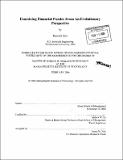Examining financial puzzles from an evolutionary perspective
Author(s)
Guo, Kenrick
DownloadFull printable version (5.297Mb)
Other Contributors
Massachusetts Institute of Technology. Operations Research Center.
Advisor
Andrew W. Lo.
Terms of use
Metadata
Show full item recordAbstract
In this thesis, we examine some puzzles in finance from an evolutionary perspective. We first provide a literature review of evolutionary psychology, and discuss three main findings; the frequentist hypothesis, applications from risk-sensitive optimal foraging theory, and the cheater detection hypothesis. Next we introduce some of the most-researched puzzles in the finance literature. Examples include overreaction, loss aversion, and the equity premium puzzle. Following this, we discuss risk-sensitive optimal foraging theory further and examine some of the financial puzzles using the framework of risk-sensitive foraging. Finally, we develop a dynamic patch selection model which gives the patch selection strategy that maximizes an organism's long-run probability of survival. It is from this optimal patch strategy that we observe loss aversion. Throughout the thesis, we stress the following: humans' behavior in financial markets is neither inherently irrational, nor is it rational. Rather the puzzles occur as a consequence of evolutionarily-optimal cognitive mechanisms being utilized in environments other than the ancestral domain in which they evolved to adapt in.
Description
Thesis (S.M.)--Massachusetts Institute of Technology, Sloan School of Management, Operations Research Center, 2006. Includes bibliographical references (leaves 74-79).
Date issued
2006Department
Massachusetts Institute of Technology. Operations Research Center; Sloan School of ManagementPublisher
Massachusetts Institute of Technology
Keywords
Operations Research Center.